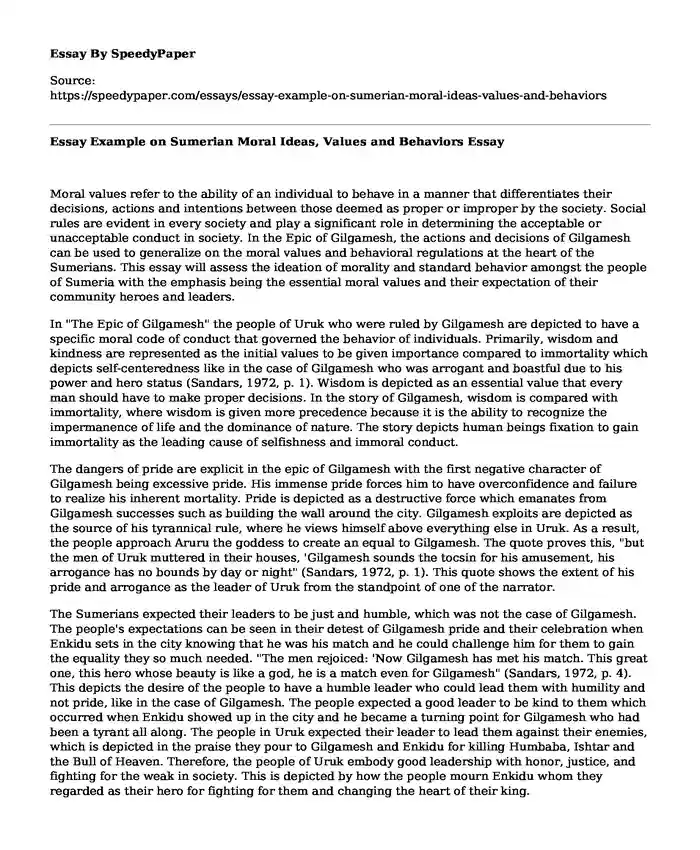
| Type of paper: | Essay |
| Categories: | History Culture Community World literature |
| Pages: | 3 |
| Wordcount: | 712 words |
Moral values refer to the ability of an individual to behave in a manner that differentiates their decisions, actions and intentions between those deemed as proper or improper by the society. Social rules are evident in every society and play a significant role in determining the acceptable or unacceptable conduct in society. In the Epic of Gilgamesh, the actions and decisions of Gilgamesh can be used to generalize on the moral values and behavioral regulations at the heart of the Sumerians. This essay will assess the ideation of morality and standard behavior amongst the people of Sumeria with the emphasis being the essential moral values and their expectation of their community heroes and leaders.
In "The Epic of Gilgamesh" the people of Uruk who were ruled by Gilgamesh are depicted to have a specific moral code of conduct that governed the behavior of individuals. Primarily, wisdom and kindness are represented as the initial values to be given importance compared to immortality which depicts self-centeredness like in the case of Gilgamesh who was arrogant and boastful due to his power and hero status (Sandars, 1972, p. 1). Wisdom is depicted as an essential value that every man should have to make proper decisions. In the story of Gilgamesh, wisdom is compared with immortality, where wisdom is given more precedence because it is the ability to recognize the impermanence of life and the dominance of nature. The story depicts human beings fixation to gain immortality as the leading cause of selfishness and immoral conduct.
The dangers of pride are explicit in the epic of Gilgamesh with the first negative character of Gilgamesh being excessive pride. His immense pride forces him to have overconfidence and failure to realize his inherent mortality. Pride is depicted as a destructive force which emanates from Gilgamesh successes such as building the wall around the city. Gilgamesh exploits are depicted as the source of his tyrannical rule, where he views himself above everything else in Uruk. As a result, the people approach Aruru the goddess to create an equal to Gilgamesh. The quote proves this, "but the men of Uruk muttered in their houses, 'Gilgamesh sounds the tocsin for his amusement, his arrogance has no bounds by day or night" (Sandars, 1972, p. 1). This quote shows the extent of his pride and arrogance as the leader of Uruk from the standpoint of one of the narrator.
The Sumerians expected their leaders to be just and humble, which was not the case of Gilgamesh. The people's expectations can be seen in their detest of Gilgamesh pride and their celebration when Enkidu sets in the city knowing that he was his match and he could challenge him for them to gain the equality they so much needed. "The men rejoiced: 'Now Gilgamesh has met his match. This great one, this hero whose beauty is like a god, he is a match even for Gilgamesh" (Sandars, 1972, p. 4). This depicts the desire of the people to have a humble leader who could lead them with humility and not pride, like in the case of Gilgamesh. The people expected a good leader to be kind to them which occurred when Enkidu showed up in the city and he became a turning point for Gilgamesh who had been a tyrant all along. The people in Uruk expected their leader to lead them against their enemies, which is depicted in the praise they pour to Gilgamesh and Enkidu for killing Humbaba, Ishtar and the Bull of Heaven. Therefore, the people of Uruk embody good leadership with honor, justice, and fighting for the weak in society. This is depicted by how the people mourn Enkidu whom they regarded as their hero for fighting for them and changing the heart of their king.
Conclusion
In conclusion, the people of Uruk have clear moral values that they use to judge the unbecoming behavior of their leader. Through their moral values, they find fault in the pride and tyranny of Gilgamesh who is sexually immoral and depicts himself better than anyone in Uruk. The people rejoice when Enkidu shows up in the hope that he would give them equality and justice they longed for by challenging their tyrannical king.
References
Sandars, N. (Ed.). (1972). The epic of Gilgamesh. Penguin. Penguin Classics ISBN 0 14 044.100X pp. 61-125
Cite this page
Essay Example on Sumerian Moral Ideas, Values and Behaviors. (2023, Jan 22). Retrieved from https://speedypaper.net/essays/essay-example-on-sumerian-moral-ideas-values-and-behaviors
Request Removal
If you are the original author of this essay and no longer wish to have it published on the SpeedyPaper website, please click below to request its removal:
- Moral Dilemmas - Essay Example about Ethics
- Essay Sample: Distribution of Power to Reduce Intense Conflict and Inequality
- Essay Sample about Political and Social Change During the Early Meiji
- Essay Sample Expanding a Colleague's Position on Writing a Literature Review
- Minor Project 1 Exegetical Study
- Free Essay: Impacts of The BP Gulf Spill
- Essay Example - Why Music Can Be Considered a Language
Popular categories




